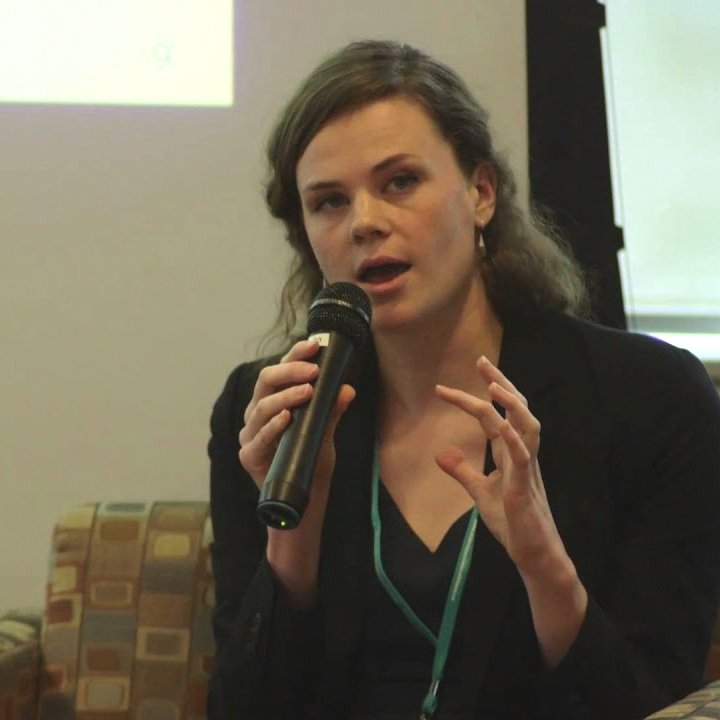Past Events
Find video and resources from past events below.
In this seminar, Emily Faux (Newcastle University, UK) will discuss her Ph.D. work in progress, with a focus on her use of collage as a method for representing nuclear weapons and war.
RSVP here.
Please join us on Friday, March 21st at noon (Eastern Time) for the research presentations of our 2024-2024 Spotlight Scholars.
Ronay Bakan (John Hopkins), Lauren Baker (Northwestern), and Be Stone (Rhodes College) will provide short presentations of their ongoing research. We will then open it up for a Q&A with the audience. The work of all three of our Spotlight Scholars exemplifies the virtues of interpretive research. We hope you can join us.
The session is free and open to the public, but registration is required. To register, please click here.
In this seminar, Dr Kathryn Brimbelcombe-Fox (Curtin University) will discuss her work with hosts and attendees. The event is associated with the exhibition DRONE: Ghosts and Shadows hosted by University of Southern Qld Art Gallery in Toowoomba, QLD.
Interpretivists do Interpretive Methods Series
Fred Schaffer (UMass Amherst) will speak about interpretive interviewing drawing both from his own research on ordinary language interviewing and from other interpretive scholars’ use of interviewing as a research tool.
This talk will take place from 12:00 PM to 1:30 PM (Eastern Time), via Zoom.
The talk is open to the public, but registration is required. To register, please click here.
Interpretivists do Interpretive Methods Series
Jessica Soedirgo (University of Amsterdam) and Aarie Glas (Northern Illinois University) will discuss reflexivity in interpretive research, drawing from ongoing research and their article, “Toward Active Reflexivity: Positionality and Practice in the Production of Knowledge,” published in PS: Political Science & Politics in 2020.
This talk will take place from 10:00 AM to 11:30 AM (Eastern Time), via Zoom. Please note the early start time.
The talk is open to the public, but registration is required. To register, please click here.
The International Relations Theory Section has extended the deadline for nominating papers to be considered for the APSA IR Theory Graduate Student Paper Award. While at APSA 2024, did you present a paper with a substantial IR theory component? Did you serve on or attend a panel at which a terrific paper was presented? Please consider submitting your own paper or nominating a paper that you encountered. Papers presented at APSA 2024 in Philadelphia are eligible for consideration. Nominations are due by January 15, 2025.
Interpretivists do Interpretive Methods Series
Diana S. Kim (Georgetown) will speak about archival research and interpretive methods drawing from her work on Southeast Asia's colonial histories and her book, Empires of Vice (Princeton University Press).
This talk will take place from 12:00 PM to 1:30 PM (Eastern Time), via Zoom.
The talk is open to the public, but registration is required. To register, please click here.
Peregrine Schwartz-Shea, Professor Emerita, University of Utah has endowed the “Schwartz-Shea and Yanow Dissertation Fellowship for Interpretive Research in the Department of Political Science.” The Fellowship honors her decades-long collaboration with Professor Dvora Yanow (Emerita, California State University, Hayward [East Bay]) and provides funds to support dissertation projects that employ interpretive methodologies and their associated methods in the conduct of empirical research. To learn more about the fellowship, visit https://poli-sci.utah.edu/giving/schwartz-shea-yanow-fellowship.php.
This event is organized to demystify the process of securing research funds for qualitative and ethnographic projects for early-career scholars. What kinds of resources are available for these types of research, and what are some best practices for crafting proposals? This panel will bring together recent awardees of three different types of grants/fellowships — the National Endowment for the Humanities (NEH), the National Institutes of Health (NIH), and the Social Science Research Council (SSRC) — for a conversation about their experiences preparing applications. Panelists will provide advice on different types of funding mechanisms, how to pitch qualitative and ethnographic projects, and tips for writing a strong proposal.
This event will be moderated by Youngrim Kim (Rutgers University), a member of the DEWG steering committee.
This event is by the Rutgers Digital Ethnography Working Group.
Interpretivists do Interpretive Methods Series
Ellie Knott (LSE) will speak to research ethics through an interpretive lens, drawing from her ethnographic research in Moldova and Crimea.
This talk is open to the public, but registration is required.
Interpretivists do Interpretive Methods Series
Nicholas Rush Smith (CUNY-City College) and Erica Simmons (University of Wisconsin, Madison) will speak to the use of comparison with an ethnographic sensibility. This talk will take place via Zoom. The talk is open to the public, but registration is required.
This roundtable showcases recent research in interpretive political science, bringing together authors of new books in a conversation that will shed light on new directions in interpretive methods and methodologies.
Please join other members of the IMM group at our annual business meeting during the annual meeting of the American Political Science Association in Philadelphia.
The café allows for one-on-one and group discussions, networking and support in an informal setting. Here, café “visitors” will find several round tables set up in the café meeting room; each table has a placard which displays the method being discussed at that table (e.g., “Interviewing”) and one or two “specialists” in that research method sitting at that table.
From interrogating concepts such as state failure to evaluating methods for studying sex work or collecting data at-a-distance, from unpacking policy-makers' prioritizations of disease management over eradication to calls for a political science that engenders political change, this panel spotlights the many important ways interpretive and critical sensibilities can enhance the study of states and the societies that inhabit them.
















